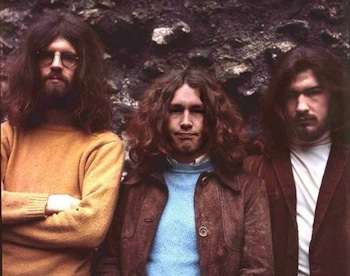Egg

Egg was an obscure Progressive Rock/Psychedelic Rock trio (Not to be confused with The Egg or Eggs) active in 1969-1972 - and briefly again in 1974 for a farewell album - consisting of Mont Campbell on bass and vocals, Dave Stewart (Not of Eurythmics) on keyboards and Clive Brooks on drums. They can be considered to be a part of the Canterbury Scene, which consisted of progressive rock and jazz musicians centered around Canterbury in the late 60s and early 70s. They grew out of a band called Uriel (also known as Arzachel), but the name was changed because it sounded too much like "urinal".
Some consider the band to be the poor man's version of Emerson, Lake & Palmer and indeed Mont Campbell himself has cited them as a main influence, but working in roughly the same genre and having the same lineup of instruments is about as much similarities as these bands have sound wise. Campbell has also stated that he considered the later career of ELP to be a Sell Out.
The bands sound is dominated by the Hammond organ, quotations from classical music (though Egg was more influenced by more modern classical music, especially Igor Stravinsky) mixed in with jazzy improvisation, quirky humorous lyrics (with a hefty dose of humor in the music as well) and constantly changing time signatures.
The band released two albums during their 'official' active years: Egg (1970) and Polite Force (1971). Having barely enough gigs to stay alive and unable to secure a contract for a third record they disbanded. In 1974 they reunited briefly to record unreleased material that resulted in The Civil Surface.
Their music can be found on YouTube and here.
- Breakup Breakout: The guitarist from Uriel / Arzachel, Steve Hillage, is more usually remembered for being a member of Gong during that group's most popular era, or for guest appearances on some albums by electronica group The Orb.
- Common Time: Played with, mostly averted
- Concept Album: Surprisingly, averted.
- Cover Version: Of Bach's Fugue in d
- Doing It for the Art: Mont Campbell has said that he thinks self-indulgence is a good thing in music.
- Epic Rocking: As per usual with Progressive Rock. The first album had the 20 minute (and appropriately named) Symphony no. 2 and the second one: Long Piece No. 3. Plenty of other pieces pass the 8 minute mark.
- Follow the Leader: The Nice and Emerson, Lake & Palmer.
- Instrumentals: Plenty.
- Improv: Plenty of Jazz influences.
- Lampshade Hanging: Seven Is A Jolly Good Time is appropriately enough (partly) ... in 7/8.
- Lonely Piano Piece: "They Laughed When I Sat Down At The Piano" is possibly a Parody of this.
- Long Title: "The Song Of McGillicudie The Pusillanimous (or don't worry James, your socks are hanging in the coal cellar with Thomas)"
- Mohs Scale of Rock and Metal Hardness: 1-4
- Neoclassical Punk Zydeco Rockabilly
- Nobody Loves the Bassist: Mont Campbell can be considered an aversion of this, since he is also the singer and composer of the band and bass is featured quite prominently in the music.
- Non-Appearing Title: All of the albums.
- Progressive Rock: A very pure example of it.
- Real Life Writes the Plot: An element shared by bands of the Canterbury scene is lyrics that have to do with personal experiences.
- Rock Me, Amadeus
- Self-Titled Album
- Sex, Drugs and Rock and Roll: Averted.
- Tick Tock Tune: Germ Patrol.
- Three Chords and the Truth: Need I say it? Averted.
- Uncommon Time: Even more exaggerated than with other Prog bands.
- What Could Have Been: Mont Campbell on Egg:
It was a bit like a child that dies aged 3 of malnutrition. It gets born, it has all sorts of hope and good expectations - it learns to walk, learns to run, it learns to talk and then suddenly it gives up, because it didn't get enough nourishment. It was like that, for me.
- Word Salad Lyrics: "While Growing My Hair" features:
While covered in ink
I had time to think
Daub here for a time
But be clandestine